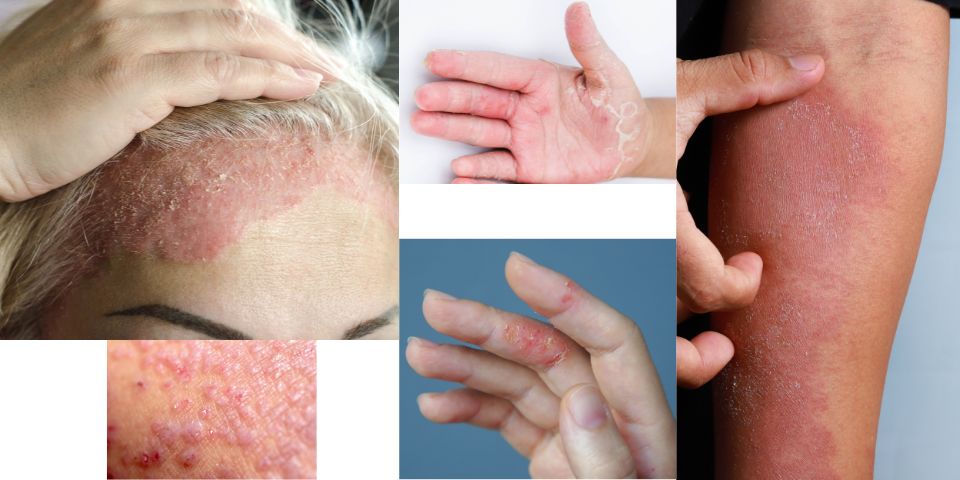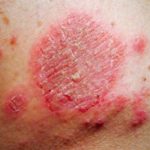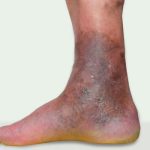8 different types of eczema blog
Most people have heard of eczema and know someone who suffers. There are actually 8 different types of eczema.
1.Atopic dermatitis
Atopic dermatitis is the most common and chronic form of eczema. This is normally what people refer to when they say the word eczema. It is the classic dry and intensely itchy patches of skin that may crack, ooze or form crusts. The most commonly affected areas include the skin flexures such as the inside of elbows and behind the knees. However, eczema can appear anywhere. When the skin is broken, either through scratching or sheer dryness, it is then vulnerable to infections.
Atopic dermatitis is part of the expression of a dominant gene, which covers hayfever, asthma and eczema. This means it is much more common than before. In these areas, the skin barrier is weakened, making it more susceptible to dryness, irritants, allergens and microbes. Symptoms can be triggered by allergens, harsh soaps, cold dry wind, central heating or stress.
2.Contact dermatitis
Contact dermatitis is when the skin comes into direct contact with something that causes irritation or an allergic reaction. Irritant contact dermatitis occurs when things like soaps, detergents, oils, hair cosmetics, bleach, household cleaning products, cold wind, and raw food can cause direct damage to the skin. Contact dermatitis affects 9% of the UK.
Symptoms include redness, swelling, itching and sometimes blisters. The reaction is usually only on the part of the skin that comes in contact with the irritant or allergen, but it can be severe if exposure continues.
This condition can affect anyone. Once the trigger is identified, avoiding the substance is critical to prevent further reactions.
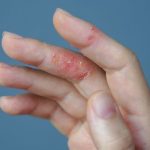
3.Pompholyx or Dyshidrotic
Dyshidrotic eczema is when there is a sudden appearance of small, intensely itchy fluid-filled blisters on the sides of the fingers, toes, palms or soles of the feet. The skin is initially very itchy with a burning or prickling sensation. Then comes a sudden crop of small blisters (vesicles), which turn into bigger, weepy blisters, which can become infected. When the skin is infected, there is inflammation, irritation/pain, swelling and pustules.
There is often subsequent peeling as the skin dries out, and people of any skin colour can experience skin that is red or darker than the surrounding skin and dry, with painful cracks (skin fissures). Pompholyx eczema can also affect the nail folds and skin around the nails, causing swelling (paronychia).
Triggers include stress, exposure to certain metals (like nickel or cobalt), seasonal allergies or excessive moisture on the hands and feet due to disrupted sweating mechanisms in people with dyshidrotic eczema.
This form of eczema is more common in older children and adults and tends to occur in cycles, and flares can last for weeks.
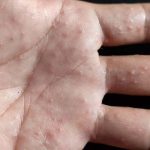
4.Discoid or nummular eczema
Nummular eczema, also known as nummular dermatitis or discoid eczema, is characterized by coin-shaped spots of irritated, itchy skin. These spots can become crusty or scaly. It is often mistaken for ringworm due to their similarities in appearance. This is the itchiest form of eczema, and this can be very frustrating for the sufferer.
Discoid eczema can also develop on an area of skin that has been damaged or scarred from a scratch, bite, burn or localised area of infection. It can sometimes be triggered by drugs, especially medications that have a side effect of skin dryness.
My case study helping with this type of eczema can be found by clicking the link.
5.Seborrhoeic dermatitis
Seborrhoeic dermatitis is a chronic form of eczema that affects oily areas of the body, such as the scalp, face (around the nose and eyebrows) and/or upper and central chest. It causes red, greasy and inflamed skin covered with white or yellowish scales. It affects 4% of UK adults. In adults, it is commonly referred to as dandruff if it is only on the scalp. In babies it is called “cradle cap.” The condition can be recurrent, with flares often triggered by stress, cold weather, hygiene practices or hormonal changes.
This can often be an embarrassing condition as sufferers are aware of the unsightly flakes of skin which may be present on their clothing or face.
Seborrhoeic dermatitis is not contagious or related to diet, but it may be aggravated by illness, stress, tiredness, changes of season and a general deterioration of health. People with an immunodeficiency (especially infection with HIV), a heavy alcohol intake, or a neurological disorder such as Parkinson’s disease or stroke, are more prone to it.
Psoriasis is another common skin condition and often coexists with seborrhoeic dermatitis.
6.Statis dermatitis or Varicose eczema
Stasis dermatitis develops due to poor circulation in the lower legs, often as a result of veins not working correctly. Blood then pools in the veins instead of flowing back to the heart. Symptoms include swelling, redness and itching, with the skin becoming dry, scaly and discoloured over time. In severe cases, open sores or ulcers may form, increasing the risk of infection.
This condition is most common in older adults, with 70% of those aged 70+ suffering from this condition. Those with underlying vein issues, such as varicose veins or a history of blood clots are particularly susceptible.
Other contributing factors include being overweight, immobility, and swelling caused by prolonged standing or hot weather. Trauma to the skin, such as an injury or bad insect bite, can also be a contributing factor. Varicose eczema is more common in women than in men since female hormones and pregnancy increase the risk of developing the condition.
Varicose eczema manifests as itchy, dry, flaky areas of skin. The skin may also change colour and become weepy and crusty. When the eczema settles, the skin may crack if it becomes overly-dry, or break down if scratched or picked. The skin on the lower leg generally becomes fragile – a knock to that area, with a shopping trolley, for example, can also break the skin and cause further irritation, with the risk of a leg ulcer developing.
7.Neurodermatitis
Neurodermatitis is a chronic skin and itch condition that causes intense itching and scratching. Neurodermatitis, also called lichen simplex chronicus (LCS).
Since neurodermatitis is known as a chronic itch condition, and can develop anywhere on the body that you can itch. It most commonly appears on the feet, ankles, hands, wrists, elbows, shoulders, neck, scalp, eyelids, and genital areas.
Neurodermatitis rarely goes away without treatment, and continued scratching can irritate nerve endings in skin, intensifying both itching and scratching. Over time, chronic scratching causes itchy patches of skin to become dry, leathery and thickened, which is called lichenification.
Neurodermatitis looks like thick, scaly patches of skin called plaques, which can often include lesions caused by scratching. The scaly patches can often become discoloured, and can develop a dark border around the patches.
Neurodermatitis affects 12% of the population. It most commonly affects people aged 30- 50 years old. Women have twice as much change as men of having this type of eczema. It is particularly common among elderly, Asian people.

8.Asteatotic eczema
Asteatotic eczema (also known as ‘eczema craquelé’) is a type of eczema that is more common in older people. It usually affects the shins but sometimes affects other areas such as the thighs, arms, tummy and back. In asteatotic eczema the skin becomes very dry, rough and scaly, and sometimes resembles crazy paving or a dried-up riverbed.
Homeopathy can help with ALL these types of eczema. Homeopathy addresses the root cause of these conditions as well easing the symptoms of infuriating itching.

